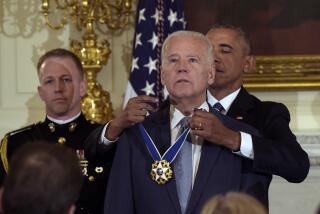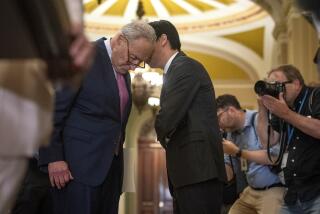Democrats divided on Obama’s political tactic
- Share via
Reporting from Washington — After the wreckage of the midterm election, Democrats with close ties to the White House are pouring out advice on how to avoid political paralysis and prepare President Obama for his reelection fight.
But a sharp fault line has emerged. Liberals want Obama to confront Republicans more directly. Moderates, remembering how Bill Clinton altered course after losing control of Congress in 1994 and won reelection in 1996, want the president to work more cooperatively with Republicans in hopes of avoiding gridlock.
“It’s clear our base feels very strongly about the president taking a firm stand,” Sen. Richard J. Durbin (D-Ill.) said in an interview. “Meanwhile, the American people are saying, ‘Come up with a solution.’ He’s torn between competing interests in the body politic.”
For now, Obama seems to be coming down on the side of those who want conciliation. He is scrambling to round up enough Republican votes in the Senate for an arms treaty with Russia that until recently had seemed like a sure thing. And he has suggested he would consider a temporary extension of tax cuts for people earning more than $250,000 annually — a concession he had once vigorously opposed.
Some progressives with strong ties to Obama are dismayed.
Christopher Edley, a former Obama campaign advisor who worked in the Clinton administration, said he was troubled that the White House appeared ready to compromise in the tax fight even before serious negotiations had started.
“You can’t build bipartisanship on preemptive concessions,” Edley said in an interview. “These are bullies who can’t be appeased.”
Edley, who also served on Obama’s transition team advisory board, added: “Too much time was squandered pursuing bipartisanship — far beyond the point of a good-faith effort. Repeating the same hopeful approach would be tragic. They need to be open to bipartisanship, but there needs to be a demonstrated interest from the other side.”
At the same time, congressional Democrats are urging that Obama take action — any action — that will show voters that the administration is still working for them. In a private meeting Thursday in the Oval Office, Rep. Steny H. Hoyer (D-Md.), the House majority leader, urged the president to retool his job-creation message by adopting the slogan “Make it in America.” In a separate meeting on the same day, Sen. Bill Nelson (D-Fla.) told fellow Democrats that Obama needed to focus more squarely on jobs, said a person familiar with the meeting.
Once wedded to an aggressive legislative strategy, Obama is likely to rely more on direct executive action that doesn’t require congressional approval.
Some of his outside advisors cheer that approach. Just last week, the Center for American Progress, a think tank with strong ties to the White House, dropped off a copy of its new study showing how Obama can advance his agenda through unilateral action.
Through his own executive powers, Obama can work to reduce oil imports, stave off home foreclosures, and delay military discharges to blunt the effects of the “don’t ask, don’t tell” policy barring gays from serving openly, the report said.
A White House official said the report would get a close look.
“It’s important for him to show he can make progress for the American people and show results for the American people, separate and apart from a purely congressional agenda,” said Neera Tanden, chief operating officer of the center and a former Obama administration aide.
One strand of advice coming in is that Obama shouldn’t follow the Clinton example. Clinton, after his party was crushed in the 1994 midterm election, pursued a strategy of “triangulation” — co-opting Republican ideas and abandoning the more ambitious parts of his own agenda.
“The overarching question is, will Obama react the same way Clinton did after the midterm setbacks?” Edley said. “If this is about history, the second act can’t be triangulation, even if that comes at the risk of a one-term presidency. I hope and believe that this guy is about making history.
“That’s audacity.”
More to Read
Get the L.A. Times Politics newsletter
Deeply reported insights into legislation, politics and policy from Sacramento, Washington and beyond. In your inbox three times per week.
You may occasionally receive promotional content from the Los Angeles Times.










